Service Alert
CD service concludes July 31, 2025
CELA's audiobooks and magazines are available in Direct to Player and downloadable formats. We no longer mail out CDs. Please contact us for more information.
CELA's audiobooks and magazines are available in Direct to Player and downloadable formats. We no longer mail out CDs. Please contact us for more information.
Showing 1 - 13 of 13 items
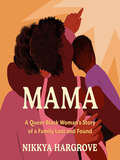
By Nikkya Hargrove. 2024
In this searing and uplifting memoir, a young Black queer woman fresh out of college adopts her baby brother after…
their incarcerated mother dies, determined to create the kind of family she never had. Growing up, Nikkya Hargrove's mother was in and out of prison. Hargrove, one of the 5 million children dealing with the effects of an incarcerated parent, spent a good portion of her childhood in prison visiting rooms. After her baby brother was born, Hargrove decided to fight for custody–even though she had only just graduated college. We see how she is subjected to preconceived notions that she, a Black, queer, young woman, cannot handle the responsibility. She shares about the shame she feels accepting food stamps, her family's reaction to her coming out, and the joy she experiences when she meets the woman who will become her wife. Whether she's clashing with her brother's biological father or battling for Jonathan's education rights after he's diagnosed with ADHD and autism, this is a woman who won't give up. Hargrove's memoir picks up where Bryan Stevenson's Just Mercy left off, exploring generational trauma and pulling back the curtain on family court and poverty in America. Moving and inspiring, Mama is an ode to motherhood and identity, to never giving up, and to finding strength in family and community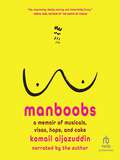
By Komail Aijazuddin. 2024
A blazing new talent's hilarious memoir about coming of age and coming out in Pakistan, moving to America, looking for…
love, and falling in love with himself along the way What do you do when you're too gay for Pakistan, too Pakistani to be gay in America, and ashamed of your body everywhere? How can you find happiness despite years of humiliation, physical danger, and a legion of Brooklyn hipsters who know you only as a queer from Whereveristan? How do you summon the courage to be yourself no matter where you are? Even as a young child in Lahore, Komail Aijazuddin knew he was different—no one else at his all-boys prep school was pirouetting off their desks, or being bullied for their "manboobs," or spontaneously bursting into songs from The Little Mermaid. Aijazuddin began to believe his only chance at a happy, meaningful life would be found elsewhere: America, the land of the free, the home of the gays. But the hostility of a post–9/11 world and society's rejection of his art, his desires, and his body would soon teach him that finding happiness takes a lot more than a plane ticket. Searching for his place between two worlds while navigating a minefield of expectations, prejudice, and self-doubt, Aijazuddin discovered—sometimes painfully, sometimes hilariously—that there are people and places he'd need to let go of to move forward. Manboobs is a riotously funny memoir of searching for love, seamlessly blending humor, politics, pop culture, and the bravery required to be yourself. Aijazuddin confidently announces himself as an exciting new voice in humor with his moving and charming reexamination of the American dream and our search for home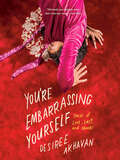
By Desiree Akhavan. 2024
Writer, actor, and director Desiree Akhavan shares the stories she was told to shut up about—hilarious, horny, heartbreaking tales of…
a life in pursuit of art, love, and a better haircut. “Hilariously raw, relatable, and—dare I even say—sexy.”—Jessi Klein When it comes to shame, Desiree Akhavan knows what she’s talking about—whether it’s winning the title of the Ugliest Girl at her high school, acquiescing to the nose job she was lovingly forced into by her Iranian parents, or losing her virginity to a cokehead she met in a support group for cutters. In You’re Embarrassing Yourself, Akhavan goes to the rawest places—the lifelong struggle to be at peace in one’s body, the search for home as the child of immigrants, the anxious underbelly of artistic ambition—in pursuit of wisdom, catharsis, and lolz. Equal parts funny and heartfelt, these seventeen essays chart an artist’s journey from outcast to overnight indie darling, to (somewhat) self-aware adult woman. The result is a collection that captures the pathetic lows and euphoric highs of our youth—and how to survive them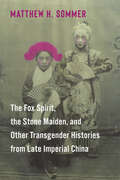
By Matthew H. Sommer. 2024
In imperial China, people moved away from the gender they were assigned at birth in different ways and for many…
reasons. Eunuchs, boy actresses, and clergy left behind normative gender roles defined by family and procreation. “Stone maidens”—women deemed physically incapable of vaginal intercourse—might depart from families or marriages to become Buddhist or Daoist nuns. Anatomical males who presented as women sometimes took a conventionally female occupation such as midwife, faith healer, or even medium to a fox spirit. Yet they were often punished harshly for the crime of “masquerading in women’s attire,” suspected of sexual predation, even when they had lived peacefully in their communities for many years.Exploring these histories and many more, this book is a groundbreaking study of transgender lives and practices in late imperial China. Through close readings of court cases, as well as Ming and Qing fiction and nineteenth-century newspaper accounts, Matthew H. Sommer examines the social, legal, and cultural histories of gender crossing. He considers a range of transgender experiences, illuminating how certain forms of gender transgression were sanctioned in particular social contexts and penalized in others. Sommer scrutinizes the ways Qing legal authorities and literati writers represented and understood gender-nonconforming people and practices, contrasting official ideology with popular mentalities. An unprecedented account of China’s transgender histories, this book also sheds new light on a range of themes in Ming and Qing law, religion, medicine, literature, and culture.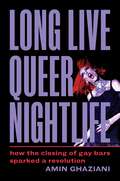
By Amin Ghaziani. 2024
It&’s closing time for an alarming number of gay bars in cities around the globe—but it&’s definitely not the last…
danceIn this exhilarating journey into underground parties, pulsating with life and limitless possibility, acclaimed author Amin Ghaziani unveils the unexpected revolution revitalizing urban nightlife.Far from the gay bar with its largely white, gay male clientele, here is a dazzling scene of secret parties—club nights—wherein culture creatives, many of whom are queer, trans, and racial minorities, reclaim the night in the name of those too long left out. Episodic, nomadic, and radically inclusive, club nights are refashioning queer nightlife in boundlessly imaginative and powerfully defiant ways.Drawing on Ghaziani&’s immersive encounters at underground parties in London and more than one hundred riveting interviews with everyone from bar owners to party producers, revelers to rabble-rousers, Long Live Queer Nightlife showcases a spectacular, if seldom-seen, vision of a queer world shimmering with self-empowerment, inventiveness, and joy.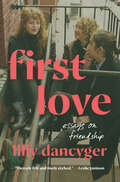
By Lilly Dancyger. 2024
A bold, poignant essay collection that treats women&’s friendships as the love stories they truly are, from the critically acclaimed…
author of Negative Space&“Fiercely felt and finely etched.&”—Leslie Jamison, New York Times bestselling author of The Empathy ExamsLilly Dancyger always thought of her closest friendships as great loves, complex and profound as any romance. When her beloved cousin was murdered just as both girls were entering adulthood, Dancyger&’s devotion to the women in her life took on a new urgency—a desire to hold her friends close while she still could. In First Love, this urgency runs through a striking exploration of the bonds between women, from the intensity of adolescent best friendship and fluid sexuality to mothering and chosen family.Each essay in this incisive collection is grounded in a close female friendship in Dancyger&’s life, reaching outward to dissect cultural assumptions about identity and desire, and the many ways women create space for each other in a world that wants us small. Seamlessly weaving personal experience with literature and pop culture—ranging from fairy tales to true crime, from Anaïs Nin and Sylvia Plath to Heavenly Creatures and the &“sad girls&” of Tumblr—Dancyger&’s essays form a kaleidoscopic story of a life told through friendships, and an expansive interrogation of what it means to love each other.Though friendship will never be enough to keep us safe from the dangers of the world, Dancyger reminds us that love is always worth the risk, and that when tragedy strikes, it&’s our friends who will help us survive. In First Love, these essential bonds get their due.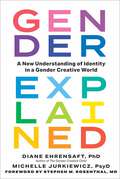
By Diane Ehrensaft, Michelle Jurkiewicz. 2024
A world-leading expert and clinical psychologist team up to explain everything you may not know about gender: what it is,…
where it came from, and why it’s changing. Gender is everywhere. Politicians argue over it, educational systems struggle to define it, and our friends, neighbors, and children explore it. More than ever before, young people are questioning their gender identities and redefining the role of gender in their lives. How should our society—and we as individuals (parents, teachers, friends)—respond? In Gender Explained, Diane Ehrensaft, PhD, and Michelle Jurkiewicz, PsyD, separate medical fact from fear-mongering falsehoods and answer these questions: What should parents do when their child starts experiencing gender dysphoria? Which sports teams should transgender youth play on? How should schools teach young people about gender? And most important: What is gender-affirming care, and when should an individual have access to it? With clear, expert guidance, this book is a safeguard against political vitriol, and it offers urgent protection for those among us who are transgender and/or nonbinary. Far more than an introduction to gender creativity, it is an invitation to develop compassion for everyone along the gender continuum.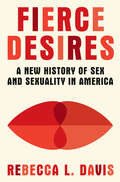
By Rebecca L. Davis. 2024
From an esteemed scholar, a richly textured, authoritative history of sex and sexuality in America—the first major account in three…
decades. Our era is one of sexual upheaval. Roe v. Wade was overturned in the summer of 2022, school systems across the country are banning books with LGBTQ+ themes, and the notion of a “tradwife” is gaining adherents on the right while polyamory wins converts on the left. It may seem as though debates over sex are more intense than ever, but as acclaimed historian Rebecca L. Davis demonstrates in Fierce Desires, we should not be too surprised, because Americans have been arguing over which kinds of sex are “acceptable”—and which are not—since before the founding itself. From the public floggings of fornicators in early New England to passionate same-sex love affairs in the 1800s and the crackdown on abortion providers in the 1870s, and from the movements for sexual liberation to the recent restrictions on access to gender affirming care, Davis presents a sweeping, engrossing, illuminating four-hundred-year account of this nation’s sexual past. Drawing on a wealth of sources, including legal records, erotica, and eighteenth-century romance novels, she recasts important episodes—Anthony Comstock’s crusade against smut among them—and, at the same time, unearths stories of little-remembered pioneers and iconoclasts, such as an indentured servant in colonial Virginia named Thomas/Thomasine Hall, Gay Liberation Front cofounder Kiyoshi Kuromiya, and postwar female pleasure activist Betty Dodson. At the heart of the book is Davis’s argument that the concept of sexual identity is relatively novel, first appearing in the nineteenth century. Over the centuries, Americans have shifted from understanding sexual behaviors as reflections of personal preferences or values, such as those rooted in faith or culture, to defining sexuality as an essential part of what makes a person who they are. And at every step, legislators, police, activists, and bureaucrats attempted to regulate new sexual behaviors, transforming government in the process. The most comprehensive account of America’s sexual past since John D’Emilio and Estelle Freedman’s 1988 classic, Intimate Matters, Davis’s magisterial work seeks to help us understand the turmoil of the present. It demonstrates how fiercely we have always valued our desires, and how far we are willing to go to defend them.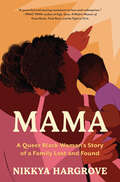
By Nikkya Hargrove. 2024
In this searing and uplifting memoir, a young Black queer woman fresh out of college adopts her baby brother after…
their incarcerated mother dies, determined to create the kind of family she never had. Nikkya Hargrove spent a good portion of her childhood in prison visiting rooms. When her mother—addicted to cocaine and just out of prison—had a son and then died only a few months later, Nikkya was faced with an impossible choice. Although she had just graduated from college, she decided to fight for custody of her half brother, Jonathan. And fight she did. Nikkya vividly recounts how she is subjected to preconceived notions that she, a Black queer young woman, cannot be given such responsibility. Her honest portrayal of the shame she feels accepting food stamps, her family&’s reaction to her coming out, and the joy she experiences when she meets the woman who will become her wife reveal her sheer determination. And whether she&’s clashing with Jonathan&’s biological father or battling for Jonathan&’s education rights after he&’s diagnosed with ADHD and autism, this is a woman who won&’t give up. Nikkya&’s moving story picks up where Bryan Stevenson&’s Just Mercy left off, exploring generational trauma and pulling back the curtain on family court and poverty in America. Mama is an ode to motherhood and identity, and to finding strength in family and community, for readers of memoirs by Ashley C. Ford, Natasha Tretheway, and Dawn Turner.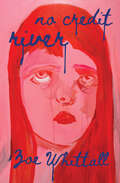
By Zoe Whittall. 2024
“It is a confusing thing to be born between generations where the one above thinks nothing is traumaand the one…
below thinks everything is trauma.”From acclaimed novelist and television writer Zoe Whittall comes a memoir in prose poetry that reconfirms her celebrated honesty, emotional acuity, and wit. Riving and probing a period of six years marked by abandoned love, the pain of a lost pregnancy, and pandemic isolation, No Credit River is a reckoning with the creative instinct itself.Open and exacting, this is a unique examination of anxiety in complex times, and a contribution to contemporary autofiction as formally inventive as it is full of heart.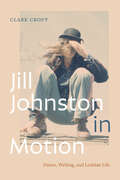
By Clare Croft. 2024
Performer, activist, and writer Jill Johnston was a major queer presence in the history of dance and 1970s feminism. She…
was the first critic to identify postmodernism’s arrival in American dance and was a fierce advocate for the importance of lesbians within feminism. In Jill Johnston in Motion, Clare Croft tracks Johnston’s entwined innovations and contributions to dance and art criticism and activism. She examines Johnston’s journalism and criticism—in particular her Village Voice columns published between 1960 and 1980—and her books of memoir and biography. At the same time, Croft attends to Johnston’s appearances as both dancer and audience member and her physical and often spectacular participation at feminist protests. By bringing together Johnston’s criticism and activism, her writing and her physicality, Croft emphasizes the effect that the arts, particularly dance, had on Johnston’s feminist thinking in the 1970s and traces lesbian feminism’s roots in avant-garde art practice.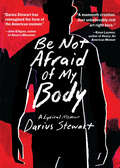
By Darius Stewart. 2024
A poet&’s &“dazzlingly propulsive&” memoir of growing up Black and gay in Knoxville, Tennessee (Kaveh Akbar, New York Times–bestselling author…
of Martyr!). Darius Stewart spent his childhood in the Lonsdale projects of Knoxville, where he grew up navigating school, friendship, and his own family life in a context that often felt perilous. As we learn about his life in Tennessee—and eventually in Texas and Iowa, where he studies to become a poet—he details the obstacles to his most crucial desires: hiding his earliest attraction to boys in his neighborhood, predatory stalkers, doomed affairs, his struggles with alcohol addiction, and his eventual diagnosis with HIV. Through a mix of straightforward memoir, brilliantly surreal reveries, and moments of startling imagery and insight, Stewart&’s explorations of love, illness, chemical dependency, desire, family, joy, shame, loneliness, and beauty coalesce into a wrenching, musical whole. Be Not Afraid of My Body stands as a compelling testament to growing up Black and gay in America, and to the drive in all of us to collect the fragments of our own experience and transform them into a story that does justice to all the multitudes we contain. &“A memorable portrait of Black gay life, from poverty and adversity to accomplishment and poetry.&” —Kirkus Reviews &“A mammoth creation . . . Just unbelievably rich art right here.&” —Kiese Laymon, New York Times–bestselling author of Heavy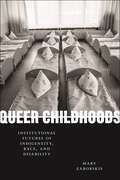
By Null Mary Zaborskis. 2024
Explores how the institutional management of children’s sexualities in boarding schools affected children’s future social, political, and economic opportunities Tracing…
the US’s investment in disciplining minoritarian sexualities since the late nineteenth century, Mary Zaborskis focuses on a ubiquitous but understudied figure: the queer child. Queer Childhoods examines the lived and literary experiences of children who attended reform schools, schools for the blind, African American industrial schools, and Native American boarding schools. In mapping the institutional terrain of queer childhoods in educational settings of the late nineteenth- and twentieth-century, the book offers an original archive of children’s sexual and embodied experiences. Zaborskis argues that these boarding schools—designed to segregate racialized, criminalized, and disabled children from mainstream culture—produced new forms of childhood. These childhoods have secured American futures in which institutionalized children (and the adults they become) have not been considered full-fledged citizens or participants. By locating this queerness in state archives and institutions, Queer Childhoods exposes a queer social history entangled with genocide, eugenics, and racialized violence.